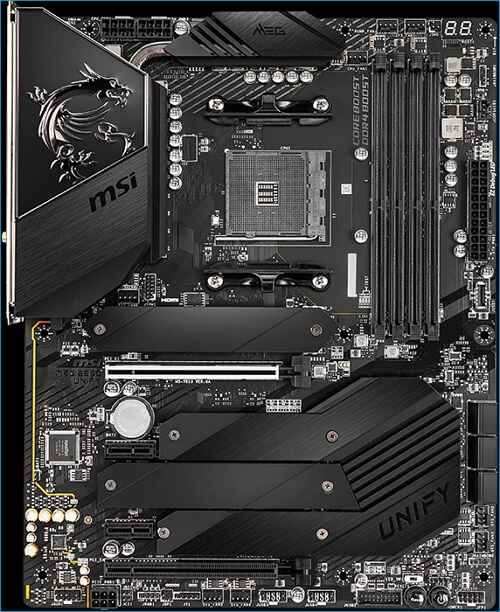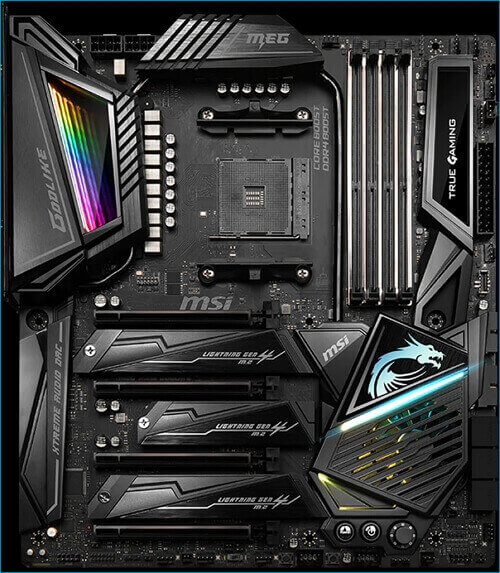If you're looking for the best AM4 motherboard for your current-gen AMD CPU, you're probably choosing between a B550 and an X570. B550 and X570 are the two most widely used mainstream chipsets for AMD Ryzen 5000-series CPUs. However, compared to the latter, the former is a higher-end chipset. Nothing to fret about; we have all the information you need to know about B550 vs. X570.
What Is B550
The B550 chipset was announced in June 2020. It is a replacement for the older generation B450 Chipset and is slightly less expensive than the X570 Chipset.

The B550 chipset is designed to work with Zen 3 Ryzen 5000 series CPUs, but since it is based on the AM4 socket, it also supports Zen 2 (Ryzen 3000 CPUs and Ryzen 4000 series APUs). The B550 chipset's target users are content creators, high-end gamers, or professional photo and video applications.
What Is X570
The X570, which debuted in July 2019, took the place of the X470 chipset from the previous iteration and supported the then-upcoming Zen 3-based Ryzen 5000-series CPUs. In addition, it is the first chipset to enable NVMe storage devices and PCIe 4.0-based graphics cards.

The AMD AM4 socket CPUs are compatible with the X570 chipset. So, if you currently own any Ryzen processors from a previous generation, you can continue using them. But keep in mind that this only applies to Ryzen 2000-series CPUs, not Ryzen 1000-series CPUs from the first generation.
570 vs. B550
Compared to the X570, the B550 is a newer chipset model. Does this mean that it is superior to the X570 motherboard? No, not really. There are subtle differences between the two chipsets that you probably won't even notice in your day-to-day work. Here is a table outlining the differences between B550 vs. X570.
| Comparison | B550 | X570 |
|---|---|---|
| Price | Lower | Higher |
| CPU Graphics Support | x16 PCIe Gen 4 | x16 PCIe Gen 4 |
| CPU Storage Support | PCIe Gen 4 | PCIe Gen 4 |
| CPU USB Ports | USB 3.2 Gen2 | USB 3.2 Gen2 |
| Dual Graphics Support | √ | √ |
| General Purpose Lanes | PCIe Gen 3 | PCIe Gen 4 |
| No. of PCIe 4.0 Lanes from Chipset |
0 |
16 |
| No. of PCIe 3.0 Lanes from Chipset |
10 |
0 |
| CPU Chipset Uplink | PCIe Gen 3 | CIe Gen 4 |
| Overclocking Support | √ | √ |
| Ryzen 2000 Series Support | × | √ |
| Ryzen 3000 Series Support | √ | √ |
| Ryzen 5000 Series Support | √ | √ |
| Overclocking | √ | √ |
The B550 and X570 chipsets should be enough for most PC gamers using an AMD CPU from the current or earlier generation.
It is evident from the comparison of the B550 and X570 Chipsets above that the key difference between these two options is the chipset's PCIe connectivity. In contrast to B550, which only has PCIe 3.0 lanes, the X570 has all PCIe lanes that are PCIe 4.0.
These specifications are theoretical upper bounds that might be construed in several ways. For instance, you would have to give up some PCIe lanes if you used all of the SATA ports that the chipset can theoretically support. Both chipsets' lanes allow for much mix-and-matching, but the X570 offers the most flexibility.
Conclusion
You are now aware of the differences between the B550 vs. X570. Everything ultimately relies on how you intend to use your computer. Therefore, the response to that query will influence your choice of motherboard. Overall, there is no discernible difference in performance between the B550 and the X570 chipsets, making them equally excellent choices for ordinary users. Generally speaking, that is.
Was This Page Helpful?
Daisy is the Senior editor of the writing team for EaseUS. She has been working at EaseUS for over ten years, starting as a technical writer and moving on to being a team leader of the content group. As a professional author for over ten years, she writes a lot to help people overcome their tech troubles.
Written by Jerry
"I hope my articles can help solve your technical problems. If you are interested in other articles, you can check the articles at the bottom of this page, and you can also check my Facebook to get additional help."
Related Articles
-
What is the Thinking Behind 32GB Windows Format Limit on FAT32?
 Daisy/2024-01-11
Daisy/2024-01-11 -
What Is an ISO File, Full Explained in Detail 2024
 Sherly/2024-10-09
Sherly/2024-10-09 -
What Is Core Sync Mac? How To Use It? [Lately Explained in 2024]
 Tracy King/2024-01-11
Tracy King/2024-01-11 -
JPG VS JPEG: What's the Difference
 Daisy/2024-01-11
Daisy/2024-01-11
